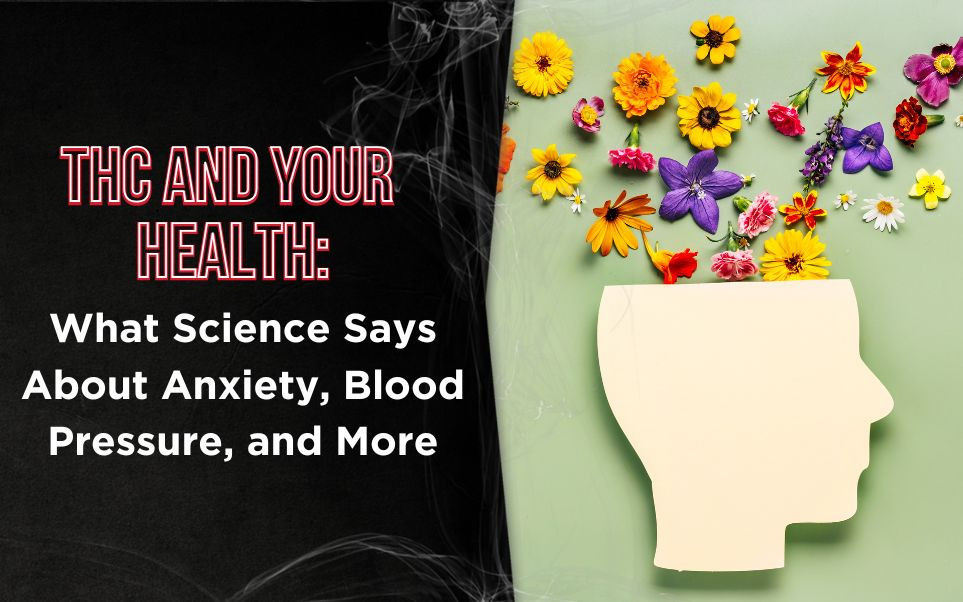THC and Your Health: What Science Says About Anxiety, Blood Pressure, and More
Estimated 0 min read
As THC (tetrahydrocannabinol) becomes more common in both recreational and medicinal use, people are asking important questions: Does THC help anxiety? Does THC raise blood pressure? Is THC addictive? The rise of cannabis-infused wellness routines has sparked a mix of curiosity and concern. For those interested in using THC for relaxation, mood enhancement, or symptom relief, understanding what science says about its impact on the body is essential.
In this article, we’ll break down the facts and myths surrounding THC’s effects on mental and physical health—covering everything from whether THC kills brain cells to whether it can cause acne. The goal isn’t to convince you one way or another—but to give you clear, honest information so you can make better choices.
Table of contents
- Understanding THC: What It Is and How It Affects the Body
- How THC Interacts With the Endocannabinoid System
- Short-Term vs Long-Term Effects of THC
- Short-Term Effects
- Long-Term Effects
- THC and Mental Health
- Does THC Help Anxiety or Make It Worse?
- Is THC Addictive or Just Habit-Forming?
- Physical Effects of THC
- Does THC Raise Blood Pressure or Lower It?
- Does THC Kill Brain Cells: Myth or Fact?
- Does THC Cause Acne or Skin Issues?
- Risks and Warnings Around THC Use
- Can You Overdose on THC: What Does an Overdose Look Like?
- Can You Be Allergic to THC: Symptoms and What to Watch For
- Is THC Bad for You: The Controversy and Context
- THC and Blood Pressure
- Does THC Lower Blood Pressure in Some Users?
- Heart Health and Long-Term Use Considerations
- Final Thoughts: Should You Use THC for Wellness?
- Consider Your Body, Medical Conditions, and Lifestyle
- Speak With a Doctor Before Self-Treating With THC
- Where to Buy THC Wholesale
Understanding THC: What It Is and How It Affects the Body
How THC Interacts With the Endocannabinoid System
THC, the psychoactive component of cannabis, interacts directly with your body’s endocannabinoid system (ECS). This system helps regulate mood, memory, appetite, pain, and even immune response.
Here’s how it works:
-
Your body naturally produces compounds called endocannabinoids.
-
These bind to CB1 and CB2 receptors in your brain and body.
-
THC mimics these natural compounds and binds mostly to CB1 receptors in the brain.
This binding is what creates that classic “high” feeling—but it also explains why THC can influence things like anxiety, blood pressure, or even inflammation.
Short-Term vs Long-Term Effects of THC
The effects of THC can vary dramatically depending on how much you use, how often, and your personal biology. Here’s a breakdown:
Short-Term Effects:
-
Altered senses and perception
-
Euphoria or relaxation
-
Short-term memory issues
-
Increased heart rate or appetite
Long-Term Effects:
-
Tolerance buildup
-
Potential cognitive changes in heavy adolescent users
-
Possible dependency (more on that below)
THC and Mental Health
Does THC Help Anxiety or Make It Worse?
The answer isn’t simple. Many people report that THC helps anxiety, especially at low doses. It can reduce racing thoughts, tension, and promote a sense of calm. However, higher doses of THC have been linked with increased anxiety, paranoia, and even panic attacks in some users.
Studies suggest:
-
Low doses of THC may help with anxiety short-term.
-
High doses may worsen anxiety—especially in new or sensitive users.
-
People with a history of anxiety disorders should be cautious.
So when asking, “does THC help anxiety”, the real answer is: it depends on the dose, the individual, and the context.
Is THC Addictive or Just Habit-Forming?
Many wonder: Is THC addictive?
Technically, cannabis use disorder (CUD) is a recognized condition. While THC isn’t considered as addictive as substances like opioids or nicotine, it can lead to dependence for some users.
Signs of THC dependence include:
-
Needing more to feel the same effects
-
Using despite negative consequences
-
Cravings or irritability when not using
That said, many people use THC responsibly without developing a problem.
Physical Effects of THC
Does THC Raise Blood Pressure or Lower It?
Here’s where it gets tricky.
-
Initially, THC can cause a temporary increase in heart rate and blood pressure.
-
But as the body relaxes, blood pressure may drop in some users.
This means both “does THC raise blood pressure” and “does THC lower blood pressure” can be true—depending on the timing and the person.
People with heart conditions should proceed with caution and talk to a doctor before using cannabis.
Does THC Kill Brain Cells: Myth or Fact?
This is one of the most persistent cannabis myths.
The idea that THC kills brain cells has largely been debunked by modern research. However, heavy or chronic use during adolescence—when the brain is still developing—may affect memory and cognition. In adults, occasional or moderate use doesn’t appear to damage brain cells.
So, does THC kill brain cells? No, not directly, but excessive use at certain life stages could have cognitive consequences.
Does THC Cause Acne or Skin Issues?
There’s no conclusive evidence that THC causes acne, but some indirect links exist:
-
Smoking cannabis may increase inflammation or clog pores.
-
Hormonal shifts from cannabis use could potentially affect the skin.
-
Edibles and non-combustible forms are less likely to have skin effects.
While does THC cause acne isn't backed by strong science, people prone to breakouts may want to monitor how their skin responds.
Risks and Warnings Around THC Use
Can You Overdose on THC: What Does an Overdose Look Like?
Let’s clarify: You cannot fatally overdose on THC. But you can take too much, especially with edibles.
Symptoms of a THC overdose include:
-
Panic or paranoia
-
Nausea and vomiting (Cannabinoid Hyperemesis Syndrome)
-
Confusion or disorientation
-
Elevated heart rate
So, can you overdose on THC? Yes—in the sense of overconsumption. But it won’t be fatal. It can still be an unpleasant and even scary experience.
Can You Be Allergic to THC: Symptoms and What to Watch For
Yes, it’s rare—but some people can be allergic to THC or cannabis in general.
Symptoms may include:
-
Hives or skin rashes
-
Sneezing or watery eyes
-
Difficulty breathing
-
Swelling of lips or throat
If you're wondering, can you be allergic to THC, pay close attention to your body and consult an allergist if needed.
Is THC Bad for You: The Controversy and Context
Is THC bad for you? It depends on how it’s used.
Potential concerns:
-
Heavy, long-term use may impair motivation or memory.
-
People with a family history of mental illness may have higher risks.
-
Smoking anything can irritate the lungs.
But moderate use in adults is generally considered safe by many health experts, especially when not combined with tobacco or other substances.
THC and Blood Pressure
Does THC Lower Blood Pressure in Some Users?
Yes. After the initial increase, THC often causes vasodilation—meaning blood vessels relax and widen, which lowers blood pressure.
This is why some users feel dizzy when standing up quickly after consuming THC. So, does THC lower blood pressure? In many cases, yes—but it varies from person to person.
Heart Health and Long-Term Use Considerations
Long-term use of THC may impact heart health depending on dosage, lifestyle, and method of consumption.
Important notes:
-
Smoking can irritate arteries.
-
People with arrhythmias or heart disease should speak to a doctor.
-
Edibles may be safer for heart health than smoking.
While THC doesn’t inherently damage the heart, pairing it with healthy choices matters.
Final Thoughts: Should You Use THC for Wellness?
Consider Your Body, Medical Conditions, and Lifestyle
When thinking about does THC help anxiety or improve wellness, it’s crucial to take a full-body approach.
Ask yourself:
-
Do I have any health conditions THC could affect?
-
How does THC typically make me feel?
-
Am I using it to relax or escape?
Speak With a Doctor Before Self-Treating With THC
The safest approach is to consult a medical professional—especially if you're considering THC for anxiety, blood pressure, or another health condition.
Doctors can help you:
-
Determine safe dosages
-
Choose effective consumption methods
-
Monitor side effects and outcomes
Where to Buy THC Wholesale
If you're a retailer, wellness brand, or licensed dispensary looking to source THC wholesale, there are several key factors to consider. First, ensure that any wholesale partner complies with both state and federal regulations. Always verify licensing, product testing, and third-party lab results to guarantee purity, potency, and safety.
Here are a few tips for buying THC wholesale safely and smartly:
-
Check for COAs (Certificates of Analysis) on each product batch.
-
Prioritize vendors offering full-panel testing (e.g., for pesticides, heavy metals).
-
Look for transparent sourcing (organically grown hemp or cannabis).
-
Work with suppliers who provide bulk pricing and consistent inventory availability.
Purchasing THC in bulk is often more cost-effective for businesses, but it comes with compliance responsibility. Whether you're stocking for a vape shop, wellness store, or medical dispensary, working with a trusted wholesaler can streamline your supply chain and maintain product quality. Be sure to review local laws regarding THC wholesale distribution in your state before proceeding.








